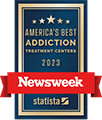Understanding Prescription Drug Addiction
Learn About Prescription Drug Abuse & Addiction
Despite the beneficial effects that prescription medications can have in individuals’ lives, studies have shown that over the past 10 years, there has been a significant increase in the number of individuals who have started to abuse prescription medications in an effort to obtain the mood-altering high that can come with doing so. There are a variety of prescription medications that are commonly abused, including:
- Antianxiety medications (Klonopin, Valium, Xanax, etc.)
- Pain medications (morphine, OxyContin, Vicodin, etc.)
- Sedatives (Ambien)
- Stimulants (Adderall, Ritalin, etc.)
When these medications are consumed for medical purposes, they can be highly effective in relieving a variety of distressing symptoms that an individual can face. However, when taken outside of a prescribing professional’s guidelines, or when consumed more often than prescribed, the result can be the development of pleasurable feelings that can become addictive. When consumed recklessly and without the consent of a professional, substances like prescription pain medications, antianxiety medications, and sedatives can bring on feelings of euphoria, relaxation, and a sense of detachment from one’s surroundings. Substances such as stimulants work to improve an individual’s focus and energy, and bring about weight loss by curbing one’s appetite. Each of these effects can be highly appealing to users, causing them to continue to abuse these medications. Once an addiction to prescription medications develops, it can be incredibly challenging to overcome without the help of a professional.
Statistics
Statistics of Prescription Drug Abuse
Researchers report that the number of individuals who abuse prescription drugs is constantly increasing. One study shows that roughly 52 million people within the United States have abused some type of prescription medication. Additionally, research has also found that prescription drug overdoses lead to more deaths than car accidents, suicides, or gunshot wounds.
Causes & Risk Factors
Causes & Risk Factors of Prescription Drug Abuse
There are a myriad of different factors that must be looked into when trying to understand why some individuals develop an addiction and others do not. Some of these factors can include:
Genetic: Years of research have shown that there is a firm genetic link to the risk of drug abuse and addiction, including abuse and addiction to prescription medication. Those who have relatives who have grappled with dependency issues are at a greater risk for struggling with similar issues than are those who do not share those same genetic links.
Environmental: There can be a variety of environmental factors that add to an individual’s vulnerability to developing a prescription drug abuse problem. One of these factors can include an individual’s exposure to drug use. If an individual spends a large amount of time within an environment where he or she is exposed to drug use, he or she will become more likely to follow suit. In addition, those who battle with a condition where they are required to take prescription medications to reduce symptoms are more likely to abuse these substances, too. The experience of one or more traumatic events can also add to the risk of developing a prescription drug abuse problem, as can an individual’s lack of coping skills to handle stress or emotional upset.
Risk Factors:
- Being the victim of abuse or neglect
- Ease of access to prescription drugs
- Family history of chemical dependency
- Experiencing a trauma
- Personal or family history of mental illness
- Suffering from a condition that requires the use of prescription drugs for symptom relief
Signs & Symptoms
Signs & Symptoms of Prescription Drug Abuse
The signs and symptoms that an individual can display when abusing prescription drugs will vary based on the type of prescription medications being abused. Some other factors that can impact the type of symptoms that one shows can include how long the abuse has been going on for and how much is being abused. Some of the behavioral, physical, cognitive, and psychosocial symptoms that might show that an individual is battling with a prescription drug abuse problem can include:
Behavioral symptoms:
- Visiting multiple doctors in order to acquire multiple prescriptions
- Stealing
- Lying
- Behaving in instigative, and sometimes aggressive, ways
- No longer participating in activities that were once enjoyed
- Frequent absences from work
- Changes in occupational performance (for example, one might show a decrease in work performance if he or she is abusing prescription painkillers)
Physical symptoms:
- Lack of good hygiene
- Bloodshot eyes
- Tremors/shakes
- Impaired coordination
- Changes in sleeping patterns (suffering from insomnia or hypersomnia, depending on the drug being abused)
- Altered eating habits
- Weight gain or loss
Cognitive symptoms:
- Delayed thought processes
- Decline in one’s ability to use appropriate decision-making skills
- Decline in one’s ability to use sound judgment
- Altered perceptions of reality
- Disorientation
- Changes in concentration capabilities
- Confusion
Psychosocial symptoms:
- Changes in temperament
- Social withdrawal or a change in the company one keeps
- Agitation
- Irritability
- Anxiety
- Depression
- Periods of emotional detachment
- Frequent mood fluctuations
- Emotional dysregulation
- Loss of interest in things or activities that were once enjoyed
Co-Occurring Disorders
Prescription Drug Abuse & Co-Occurring Disorders
The abuse of any form of drug can cause an individual to go through a number of negative consequences, and the abuse of prescription drugs is no different. These negative consequences will be based on the type of medication that is being abused. Some of the effects that this type of abuse can leave on an individual’s life can include:
- Suicidal thoughts and behaviors
- Organ damage/organ failure
- Cognitive impairment
- Onset of symptoms of other mental health conditions
- Memory disturbances
- Family discord/divorce
- Social isolation or disturbances arising within important relationships
- Interaction with law enforcement or legal ramifications as a result of falsifying reports
- Financial problems
- Occupational failure, job loss, and possible continued unemployment
Symptoms that are linked to other mental health conditions have also been known to develop among those who are battling with an addiction to prescription medications. Those who are grappling with posttraumatic stress disorder (PTSD) and who have gone through something traumatic are more likely to abuse substances to cope with those issues. In addition to PTSD, below are some of the mental health conditions that have been known to co-occur with prescription drug addiction:
- Anxiety disorders
- Additional substance use disorders
- Bipolar disorders
- Borderline personality disorder
- Depressive disorders
Effects of Withdrawal & Overdose
Effects of Withdrawal & Overdose From Prescription Drug Abuse
Effects of prescription drug withdrawal: The continued abuse of prescription drugs will lead to the development of withdrawal when an individual stops abusing them. The type of prescription drug that has been abused will determine the type of symptoms that are experienced at this time. Some of the many symptoms linked to prescription drug withdrawal can include:
- Tremors/shakes
- Diarrhea
- Vomiting
- Nausea
- Profuse sweating
- Abdominal cramping
- Restlessness
- Sleep problems
- Vivid dreams
- Disorientation
- Confusion
- Hallucinations
Effects of prescription drug overdose: An overdose can occur whenever an individual consumes more of a substance that his or her body is able to handle. All overdoses should be treated as medical emergencies and treatment should be obtained immediately to prevent death. Some of the signs that an individual might exhibit if an overdose is occurring can include:
- Lapsing into a coma
- Sudden loss of the ability to communicate
- Severe dizziness
- Cyanosis
- Respiratory failure
- Changes in skin pallor
- Severe breathing difficulties
- Dilated pupils













